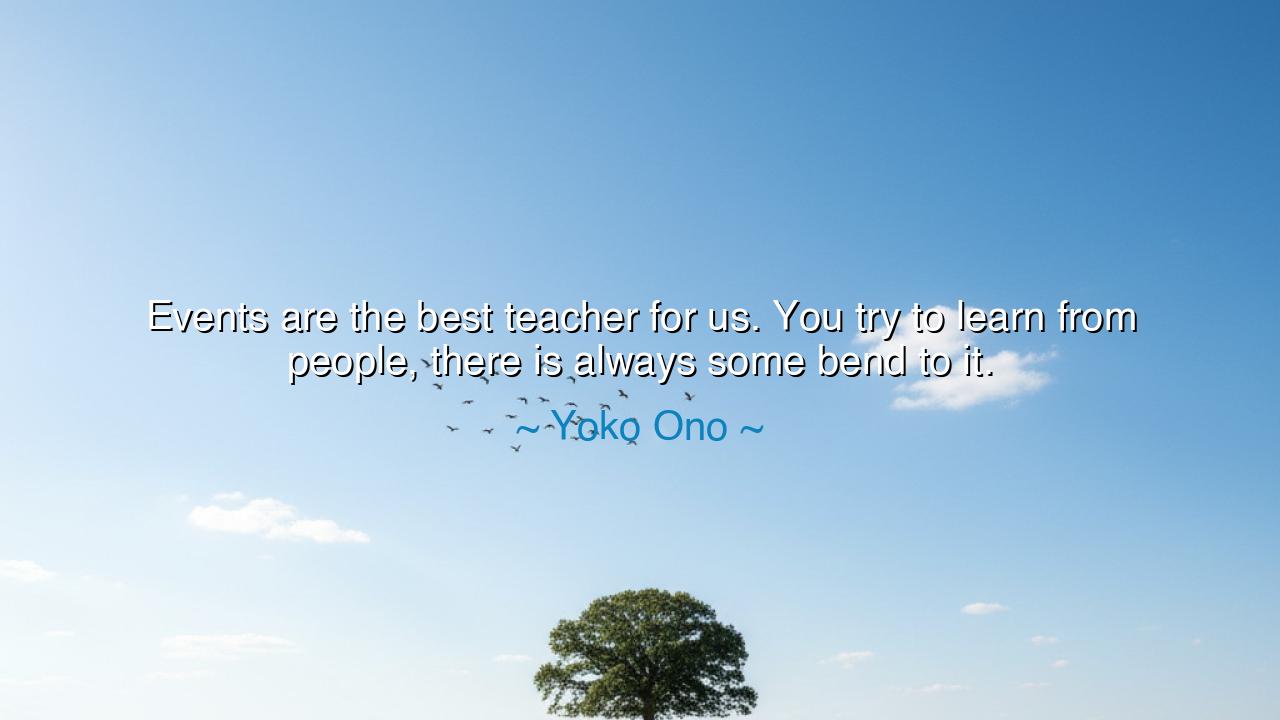
Events are the best teacher for us. You try to learn from
Events are the best teacher for us. You try to learn from people, there is always some bend to it.






Yoko Ono once said: “Events are the best teacher for us. You try to learn from people, there is always some bend to it.” In these words lies a truth both unsettling and liberating—that wisdom does not come chiefly from lectures or borrowed doctrines, but from the unfolding of life itself. Events, whether triumphant or tragic, speak to us with a voice that cannot be silenced or twisted. A man may distort his story, a mentor may color his lesson, but the raw happening of reality cannot be denied. It imprints its mark upon the soul more deeply than any secondhand word.
For Ono, whose life was scarred and shaped by both grief and creation, this truth was lived rather than imagined. She endured war as a child, loss as an artist, and the searing pain of her husband John Lennon’s death. Each event was not chosen, but each became a teacher. The war taught her survival and resilience, art taught her the freedom of imagination, and tragedy taught her the endurance of love beyond death. She knew that the lessons taken from life’s blows are more honest than any carefully spoken counsel, for reality is without bias, without “bend.”
History is filled with testimony to this wisdom. Think of Abraham Lincoln, who studied many books but found his deepest lessons in the events of his life—poverty, defeat, and repeated failure. Each loss was a greater teacher than the polished advice of peers. When he finally rose to lead his fractured nation, it was not merely knowledge of law that guided him, but the scars of lived struggle. He had been taught by events, and so he became capable of teaching a wounded people.
The ancients, too, knew this principle. The Stoics, like Epictetus, proclaimed that philosophy was not words but practice, tested in hardship. A man could hear countless teachings on patience, but until he was struck by insult or misfortune, the truth of patience would not be revealed. Events strip away illusion; they test the soul and reveal whether wisdom has taken root. As fire proves the gold, so do happenings prove the spirit.
Yet Ono also reminds us of the “bend” that comes when we learn only from others. For every human carries their own lens, their own bias, their own story. Advice, no matter how sincere, arrives bent through the prism of another life. This does not mean we should reject human guidance, but we must recognize its limits. Events are pure in their teaching; they leave no room for distortion. The flood, the war, the loss, the unexpected joy—these write their lessons in the marrow of our being.
The lesson, then, is clear: do not fear events, even the hard ones, for they are the greatest teachers. Do not resent failure, for it carries knowledge that success cannot give. Do not curse sorrow, for it teaches depth of compassion. Do not dismiss the small surprises of daily life, for each is a lesson wrapped in the garment of time. The world is the true classroom, and the hours of our lives are the lectures we cannot skip.
Practically, let us live with attentiveness. When an event occurs—whether joy or pain—ask, “What is this teaching me? What strength is it calling forth? What illusion is it breaking?” Keep a record, as the ancients kept journals, of how life’s happenings shape your soul. And when advice from others comes, weigh it carefully, but let lived experience be your final master.
Thus, Ono’s words remind us: the greatest teacher walks beside us every day, and its name is life. To honor it, we must live awake, ready to learn not only from voices, but from the unfolding of time itself. In this way, every event, great or small, becomes part of the sacred text from which we write our destiny.






AAdministratorAdministrator
Welcome, honored guests. Please leave a comment, we will respond soon